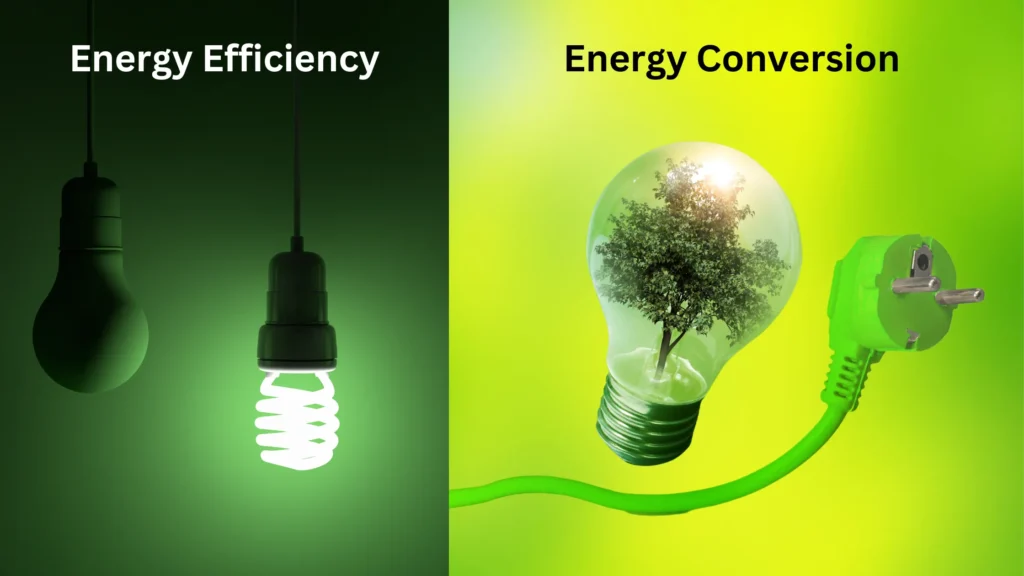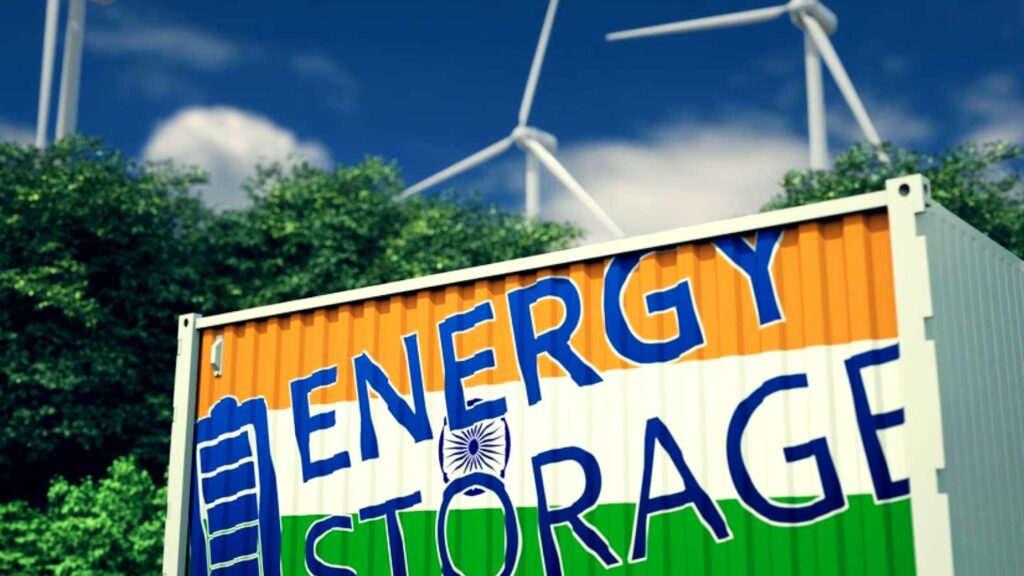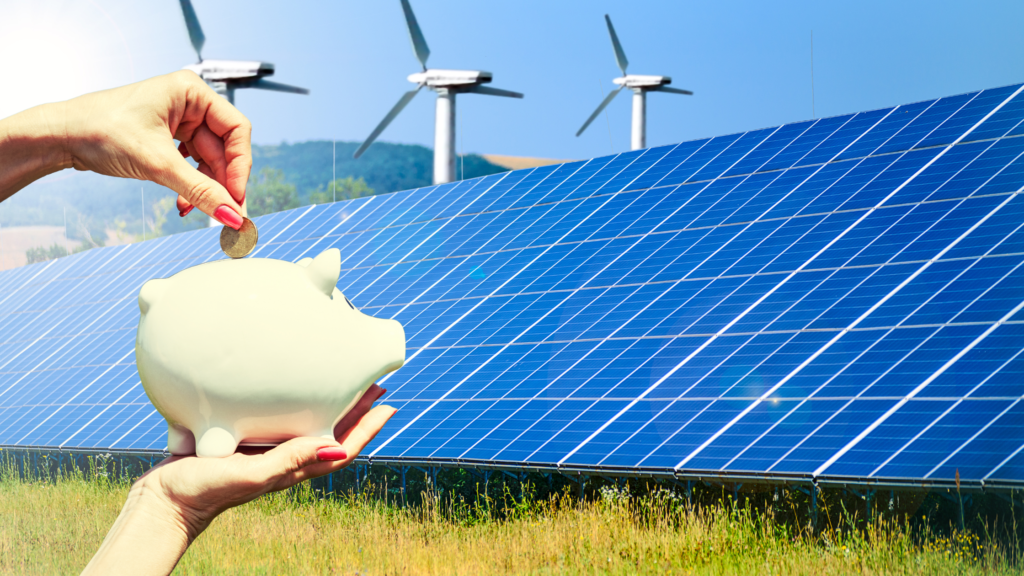
The world has never needed energy as much as it does today. As an understanding of Energy Conversion vs. Energy Efficiency grows, so does the need to manage it with the aid of industrialization, urbanization, and technological advancements. Both these concepts play an important role in the remediation of energy, mitigation of wastage and maximization of output. While both concepts are related in different ways, they mean and emphasize different things and contexts. In this blog, Niche Clean Energy will discuss and analyze the intricacies of energy conversion, and energy efficiency, their relevance, differences, practical examples, and how these concepts foster sustainability.
What is Energy Conversion?
This process of changing one kind of energy into another is known as energy conversion. All technological systems that use energy, from the simplest flashlight to the most complex nuclear power plant, require some form of energy conversion to function properly.
Energy Conversion Examples
- Battery: Batteries work on the principle of storing chemical energy and changing it to electrical energy when needed.
- Wind energy: In a wind energy conversion system, wind turbines change kinetic energy of the wind into electrical energy.
- Thermal to Mechanical Energy: In power plants, steam turbines change ‘heat energy’ (from burning fuels) into ‘mechanical energy’ used to spin electric generators to create power.
- Radiant to Chemical Energy: During photosynthesis, plants transform sunlight into stored chemical energy.
- Gravitational to Kinetic Energy: The potential energy in water stored for a long time is converted into kinetic energy in Hydropower plants in order to produce electric power.
What is Energy Efficiency?
Energy efficiency is the ability to minimize the amount of energy necessary to accomplish a task without sacrificing performance. It guarantees that all energy expended gives desirable results less any unwanted destruction of useable energy.
For instance, a standard incandescent bulb emits roughly 10% of the energy used, while the rest is wasted in the form of heat. On the other hand, LED bulbs transform almost 90% of all the energy into light and therefore have a higher energy efficiency compared to incandescent bulbs.
Energy Efficient Buildings
Another remarkable innovation is in energy-efficient buildings. These buildings are able to limit energy use thanks to insulation, smart lights, efficient heat and cooling (HVAC) systems, and double glazed windows. The use of energy saving appliances and solar panels also help minimize the consumption of energy and maximize eco-friendliness.
Smart City Energy Efficiency
There are major changes occurring in cities due to Urbanization, so smart city energy efficiency is one of the essential developments to modern infrastructure. In efforts to improve sustainability and reduce energy consumption, smart cities integrate solutions, such as public transport optimization, smart grid technologies, or automated lighting systems.
Difference Between Energy Conversion and Energy Efficiency
Energy conversion vs energy efficiency have distinct meanings and characteristics, utilizing energy systems are only two of the many possible domains where both can be discussed. Both are essential in managing the consumption of energy, however, their approaches to handling energy are different.
-
Definition
- Changing one type of energy into another type of energy is referred to as Energy Conversion. This might be in the form of electrical energy being transformed into mechanical energy, like in generators, or chemical energy being changed into thermal energy as in combustion engines.
- The term Energy Efficiency speaks about the manner of working on an energetic task in which the energy loss is as small as possible. This, for example, ensures that a certain output is achieved with minimum input of energy as can be supplied by advanced technologies.
-
Key Approach
- The focus of Energy Conversion is on transformation of energy modes, like changing solar energy into electricity use of photovoltaic cells or internal combustion engine converting chemical energy into motion.
- Energy Efficiency focuses on minimizing the waste of energy by improving the efficiency of energy conversion processes through the implementation of solar panels and fuel combustion systems, or other advanced technologies.
-
Example from Daily Life
- Energy Conversion Example: An automobile engine transforms the chemical energy in gasoline into mechanical energy for the car movement; a hydroelectric dam transforms the kinetic energy of flowing water into electric energy.
- Energy Efficiency Example: Replacing incandescent bulbs that waste light with LED lights that use electricity more efficiently, or the application of synergetic motors in industry.
-
Implementation
- Conventional thermal power plants, nuclear power plants, and even household devices such as electric kettles implement Energy Conversion.
- Energy Efficiency can be achieved, for example, with the application of energy-efficient generators, motors, or heating systems which minimize losses during the conversion processes.
-
Impact on Sustainability
- Though Energy Conversion is an integral aspect of any functioning entity, it is the principal source of available energy, and poor conversions will result in lost energy as waste or heat produced.
- Energy Efficiency is accomplished by reducing output energy not effectively used to the bare minimum such as carbon emission as well as resource depletion.
-
Economic Benefits
- Energy conversion is essential in a range of tasks such as power generation, transportation, and various industries. Increased operational costs and energy loss comes from inefficient energy conversion methods which yields low productivity.
- Improvements in cost savings from Energy Efficiency stems from lowered electricity, reduced fuel consumption, and increased system lifespan due to less energy wasted in the conversion process.
-
Role in Smart Cities
- Cities are powered by Energy Conversion technologies like renewable sources, solar, wind, and hydro electricity.
- Integrated into the smart grids, energy-efficient buildings and transporters known as sustainable structures guarantee Energy Efficiency with no or minimal absolute energy waste.
Thus, energy conversion vs energy efficiency is a different but related topic that has a few key differences mentioned above from the perspective of Niche Clean Energy.
National Mission for Enhanced Energy Efficiency (NMEEE)
The India Government has taken the initiative of National Mission to Enhance Energy Efficiency as part of the National Action Plan on Climate Change (NAPCC). It’s goal is to reduce energy usage as well as greenhouse gases by promoting delineated efficiency processes in industries and households. Highlighted program strategies include NMEEE:
- Perform, Achieve and Trade (PAT): This scheme works as a mechanism to enhance energy efficiency in industries in a market driven environment.
- Market Transformation for Energy Efficiency (MTEE): This transforms the markets to enable the increased use of energy efficient devices.
- Energy Efficiency Financing Platform(EEFP): Stimulates investments in energy efficiency projects.
- Framework for Energy-Efficient Economic Development(FEEED): Provides assistance for energy efficiency undertakings on a wider scale.
What Energy Conversion Processes Support Water Circulation?
The water cycle is a good example of one of the natural processes of energy conversion. The basic energy conversions that support the water cycle consist of:
- Solar Energy to Thermal Energy: Water bodies absorb heat from the sun and begin to evaporate.
- Thermal Energy to Mechanical Energy: Water vapor rises cools and condenses into clouds. Eventually, the clouds precipitate.
- Potential Energy to Kinetic Energy: Water in reservoirs moves downstream, flowing into hydropower plants that generate electrical energy.
These natural forms of energy transfer are critical in sustaining the ecosystem, climate control and supply water necessary for existence on Earth.
Efficiency to Energy Conversion
Efficiency to energy conversion is a metric describing energy wastage in the transformation process of one energy form to another. For instance:
- A high-quality wind energy conversion system is said to be efficient if a lot of wind energy converted and captured can be used as electricity.
- If a vehicle’s internal combustion engine converts fuel’s chemical energy into mechanical energy, only around 30% of this energy will be harnessed; the rest will be dissipated as heat.
- Dams that help generate hydroelectric power are some of the most efficient at converting energy with an impressive 80-90% efficiency.
Why We Should Optimize Energy Conversion and Energy Efficiency
Understanding Energy Conversion vs Energy Efficiency is key for numerous purposes:
- Less Waste: My energy use and potential waste decreases carbon emissions and other forms of pollution.
- Saving Money: My use and conversion of energy serves to reduce my expenses like paying for electricity or buying new equipment.
- Effective Resource Management: Efficiency in my energy use guarantees adequate consumption of provided resources.
- Fostering Economic Development: Having efficient systems helps reduce the consumption of resources while allowing the economy to grow.
- Improved Energy Independence: Decrease reliance on fossil fuels means greater independence regarding energy.
Examples Of Energy Conversion and Energy Efficiency
Energy Conversion Examples
- Solar panels convert sunlight into usable electricity.
- Hydropower plants convert electrical energy into energy due to a stored potent gravitational potential.
- Biomass power plants turn organic materials into heat and electricity.
- In wind turbines, Kinetic energy from the wind is converted into electricity by windmills.
Examples of Energy Efficiency
- LED bulbs: Unlike incandescent bulbs, LED bulbs use significantly less electricity.
- Smart Thermostats: A smart thermostat will adjust the heating or cooling of a home depending on whether it is occupied.
- Energy-efficient buildings: Special forms of housing use advanced forms of insulation to minimize energy use.
- Electric vehicles (EVs): Compared to gasoline cars, electric vehicles consume less energy.
Improvements in the New Power Source Transition Center and Modern Efficiency: Shaping The Future
The advancement of new sources of energy relies on the improvement of power conversion and overall efficiency. The use and capture of energy will improve even further due to new developments in renewables, smart grid technology, AI energy management, and smart city energy efficiency programs. All nations have begun pouring vast sums of money into the R&D of systems that capture as much energy as possible and waste as little as possible, and these ultra-efficient systems will be deployed in years to come.
Final remarks
This discussion has clearly shown that in the Energy Conversion vs Energy Efficiency debate, both areas are essential for a sustainable outcome. Energy conversion enables us to change resources into useful forms, and in order for those resources to be put to best use, energy efficiency comes into play, which minimizes waste and maximizes useful output. The world is slowly moving toward more environmentally friendly approaches; therefore, recognition and application of these principles is the crux of sustainability of energy in the foreseeable future.


